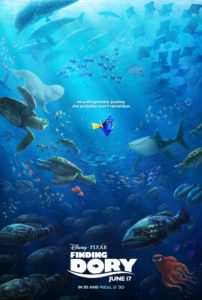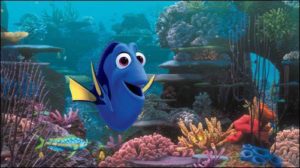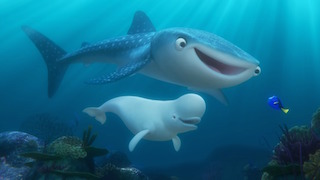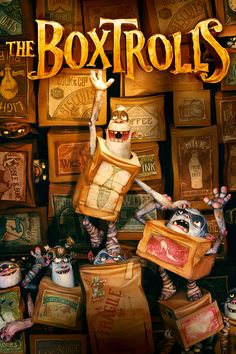 Finding Nemo is a splendid film on a number of levels. It’s a kid-friendly, fun-loving flick that simultaneously tackles some very adult issues, like how fear and anxiety have a terrifying ability to cause us to hurt the ones we love the most; it’s a heartwarming tale about a father’s search for his son, about a paradise lost and restored. Nemo is also noteworthy because of its contributions to furthering the art of animation as a storytelling medium as it brings to life, in painstaking and resplendent detail, the vast and mysterious world that exists under the sea; and if you are interested in hearing more about the themes and significance of Finding Nemo, please check out the most recent episode of Reel World: Rewind. I bring all of this to your attention, however, precisely because Finding Dory has some very big shoes to fill and high expectations to meet—and not solely due to the strength of its predecessor, either. Pixar’s latest offering is automatically fighting an uphill battle for at least two other reasons. First, since Finding Dory is a sequel, it is an easy target for the scores of internet curmudgeons who love to bemoan the prevalence of sequels and remakes as an indicator of the film industry’s lack of originality. (And, to be fair, many sequels and remakes—including some in the Pixar canon—are rather forgettable.) Second, Finding Dory has the misfortune of premiering in a relatively rough patch for Pixar, with their last few films (Inside Out excluded) failing to captivate, move, and entertain as satisfyingly as their earlier works. In short, Andrew Stanton and company need a truly special film in order to succeed. And succeed they have.
Finding Nemo is a splendid film on a number of levels. It’s a kid-friendly, fun-loving flick that simultaneously tackles some very adult issues, like how fear and anxiety have a terrifying ability to cause us to hurt the ones we love the most; it’s a heartwarming tale about a father’s search for his son, about a paradise lost and restored. Nemo is also noteworthy because of its contributions to furthering the art of animation as a storytelling medium as it brings to life, in painstaking and resplendent detail, the vast and mysterious world that exists under the sea; and if you are interested in hearing more about the themes and significance of Finding Nemo, please check out the most recent episode of Reel World: Rewind. I bring all of this to your attention, however, precisely because Finding Dory has some very big shoes to fill and high expectations to meet—and not solely due to the strength of its predecessor, either. Pixar’s latest offering is automatically fighting an uphill battle for at least two other reasons. First, since Finding Dory is a sequel, it is an easy target for the scores of internet curmudgeons who love to bemoan the prevalence of sequels and remakes as an indicator of the film industry’s lack of originality. (And, to be fair, many sequels and remakes—including some in the Pixar canon—are rather forgettable.) Second, Finding Dory has the misfortune of premiering in a relatively rough patch for Pixar, with their last few films (Inside Out excluded) failing to captivate, move, and entertain as satisfyingly as their earlier works. In short, Andrew Stanton and company need a truly special film in order to succeed. And succeed they have.
With the most emotionally affecting opening scene since Up, Finding Dory gives us a brief history its titular character (Ellen DeGeneres), from childhood to her first encounter with Marlin (Albert Brooks), and then skips forward to one year after the events in Nemo. Thanks to a set of circumstances that parallel events from her childhood, Dory is able to remember that she has been separated from her parents. Armed with the name of a mysterious location and her friends Nemo (Hayden Rolence) and Marlin, she sets off to find her long-lost loved ones.
Finding Dory is the apotheosis of Pixar’s trademark blend heart and humor. Even more so than its predecessor, this film is laugh-out-loud hilarious. This is due in large part to the unforgettable (lots of memory puns in this film) cast of supporting characters. Crush, everyone’s favorite turtle (voiced by the film’s director, Andrew Stanton), makes a memorable return, but Dory is also populated with some new faces; there are a trio of sea lions (one of which—be still my heart— is voiced by Idris Elba), an Octopus with a heart of gold (Ed O’Neill), and a near-sighted whale named Jenny (Diane Keaton)—just to name a few. But the great thing—one of the reasons why Pixar is a cut above Dreamworks and the rest of the crowd—is that these “minor” characters are, by and large, not on screen just to provide a handful of laughs. Most of these lovable sea creatures add something to the story on a thematic or emotional level, and they help the plot move forward in distinct and unique ways. Finding Dory is a film that does not waste a single moment, a film where everything has significance.
is due in large part to the unforgettable (lots of memory puns in this film) cast of supporting characters. Crush, everyone’s favorite turtle (voiced by the film’s director, Andrew Stanton), makes a memorable return, but Dory is also populated with some new faces; there are a trio of sea lions (one of which—be still my heart— is voiced by Idris Elba), an Octopus with a heart of gold (Ed O’Neill), and a near-sighted whale named Jenny (Diane Keaton)—just to name a few. But the great thing—one of the reasons why Pixar is a cut above Dreamworks and the rest of the crowd—is that these “minor” characters are, by and large, not on screen just to provide a handful of laughs. Most of these lovable sea creatures add something to the story on a thematic or emotional level, and they help the plot move forward in distinct and unique ways. Finding Dory is a film that does not waste a single moment, a film where everything has significance.
Equally indispensable to this film is its score. Thomas Newman, of The Shawshank Redemption , WALL-E, and Skyfall fame, shifts effortlessly between sentimental piano motifs and pulse-pounding numbers that give the upbeat sequences a fun action film vibe. And then, in key moments, Newman lets silence say everything. On a broader level, the sound department has truly worked wonders with this movie, imbuing every creature, every object with their own unique, palpable sound and sonic texture.
First and foremost, however, Pixar is a story-driven studio; and the writing team of Andrew Stanton, Victoria Strouse, and Bob Peterson have created in Dory a character with a great deal of emotional depth. Her journey and narrative of loss, love, and growth are as emotionally arresting as Marlin’s was way back in 2003—if not more so. Ultimately, Finding Dory has some remarkably insightful things to say about living with disabilities, and I have explored this aspect of the film in a more in-depth and spoiler-y take over at Christ and Pop Culture. For the here and now (and for the sake of keeping things spoiler-free), know that Finding Dory is a whale of a tale about the love a child has for his or her parents, of the love a parent has for their child, and of the kind of love that stoops down to reach and transform the weak and the lowly. Couldn’t we all use a story like that?



1 comment